Diplomatic Bluebook 2017
Chapter 2
Japan's Foreign Policy that Takes a Panoramic Perspective of the World Map
6.Countries in the Middle East and North Africa
(1) Turkey
Turkey is a geopolitically important large country in the region located at the crossroads to Europe, the Middle East, Central Asia, and Caucasia. As a member state of NATO, the government of Turkey basically attaches importance to Europe and U.S. in its diplomacy, including efforts to join EU, while proactively promoting multiple diplomacies with states covering Asia and Africa. Turkey is historically a pro-Japanese country typified by episodes such as the visit of Ottoman Empire's Ertugrul Frigate to Japan and the subsequent disaster in 1890 and Turkey's 1985 rescue of Japanese nationals living in Tehran.
The coup d'état attempted by factions within the Turkish army on July 15 ended in failure on July 16, and the Turkish government declared a state of emergency claiming that Fethullah Gulen, the leader of an Islamist movement in Turkey who is currently living in exile in the U.S., was behind the incident. Dismissals and monitoring of persons in the army, security authorities and public servants, who are mainly said to have connections to Gulen continue.
On the diplomatic front, the relations between Turkey and Syria have deteriorated under the Assad Administration and its ongoing civil war, and Turkey is faced with being the world's largest recipient of refugees totaling about three million. The tensions with Western countries and neighboring countries are growing with the fight against ISIL and response to the refugee issue. However, an agreement was reached in June to normalize relations with Israel, which had deteriorated with Israel following the conflict between the Israel army and a flotilla of ships transporting aid to the Gaza Strip in May 2010. Furthermore, there has been progress in strategic diplomacy since June such as an initiative to normalize relations with Russia, which had deteriorated following the downing of a Russian fighter jet in November 2015.
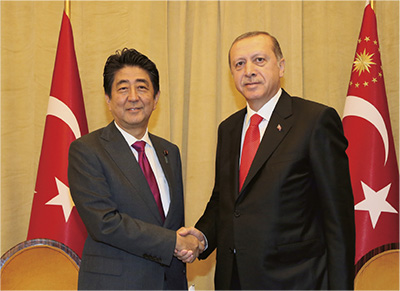 Japan-Turkey Summit Meeting (September 21, New York, U.S., Photo: Cabinet Public Relations Office)
Japan-Turkey Summit Meeting (September 21, New York, U.S., Photo: Cabinet Public Relations Office)In respect to the relationship with Japan, Prime Minister Abe met with President Erdogan in New York in September and held their sixth summit, confirming the high trust between the two leaders and stronger bilateral relations.
(2) Jordan and Lebanon
The situation in Jordan remains comparatively stable in the constantly turbulent Middle East region. Jordan has played an important role in the peace and stability of the region, such as with countermeasures against extremists, its acceptance of a number of Syrian refugees, and active involvement in the Middle East peace process. The country's role is highly appreciated by the international community.
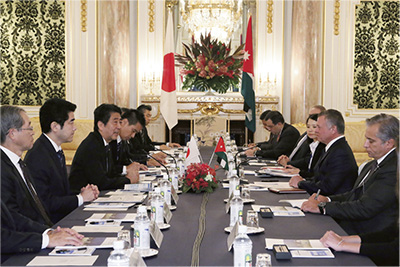 Japan-Jordan Summit Meeting (October 27, Tokyo). (Photo: Cabinet Public Relations Office)
Japan-Jordan Summit Meeting (October 27, Tokyo). (Photo: Cabinet Public Relations Office)Apart from a leaders' meeting at the April Nuclear Security Summit, there have been frequent coming and goings of the Prime Minister and ministers in 2016, such as the King Abdullah II's visit to Japan in October, and the traditionally friendly bilateral relations have deepened even further. At each meeting, the leaders shared the view of cooperating for further development of the bilateral relations in a wide range of areas and stabilization of the Middle East region.
Japan also attaches importance to Jordan, which serves as a cornerstone for the stability of the region. The Government of Japan has been providing assistance for the stability of Jordan through support for refugees and host communities, as well as for developing the industrial base. In 2016, Japan provided support such as a “Financial Sector, Business Environment and Public Service Reform Development Policy Loan” (30 billion yen), as well as grant aid (one billion yen).
Lebanon is a mosaic nation consisting of 18 religions and religious sects, including Christianity and Islam. Due to the confrontation between each sect and political force surrounding a successor to President Suleiman, who stepped down in May 2014, the position of President had remained vacant for about two and a half years, but former leader of the Free Patriotic Movement Aoun was finally elected President in October 2016. Consequently, the Hariri Cabinet was formed in December, with initiatives being promoted to stabilize domestic affairs. The future focus of domestic affairs is the parliamentary elections scheduled for May 2017, which have been previously postponed twice.
Lebanon is facing serious problems such as the deteriorating situation in Syria and the expansion of ISIL. Stability in Lebanon is the key to the stability and prosperity of the Middle East. Japan has provided Lebanon with humanitarian aid totaling more than 120 million US dollars for assistance to Syrian refugees and the host communities.
(3) Egypt
Located at the north-eastern edge of the African continent and facing Europe on the other side of the Mediterranean, Egypt is a major country which plays an important role in the stability of the Middle East and North Africa.
Egypt swore in a new parliament (House of Representatives) in January 2016, completing the “roadmap” which had been developed after the political turmoil in 2013. The El-Sisi Administration is taking initiatives in security policies and economic reforms on the Sinai Peninsula etc., for Egypt's long-term stability and development, while being a non-permanent member of the UN Security Council for two years from 2016.
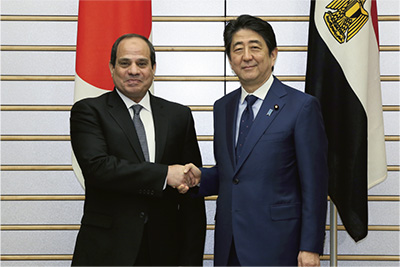 Japan-Egypt Summit Meeting (February 29, Tokyo Photo: Cabinet Public Relations Office)
Japan-Egypt Summit Meeting (February 29, Tokyo Photo: Cabinet Public Relations Office)Japan-Egypt relations are fairly good and high-level exchanges are also active. President El-Sisi visited Japan in February and during this visit, three documents (in the areas of education, energy, and health) which include the Japan-Egypt Joint Statement and the Egypt-Japan Education Partnership (EJEP) were released. Parliamentary Vice-Minister for Foreign Affairs Takisawa visited Egypt in August, followed by State Minister for Foreign Affairs Sonoura in September. Furthermore, the two leaders of Japan and Egypt held a meeting at the G20 Summit in Hangzhou (China) in September.
(4) Libya, Tunisia, Algeria, and Morocco
The Maghreb is at the crossroads to Europe, Africa, and the Middle East, and has shared history, culture, and language in common. Recently it has attracted attention because of a potential as a region. On the other hand, many people move from the region across Iraq and Syria as foreign fighters, and there is also the trend in Libya, so the stability of the security situation is an important issue.
Libya has fallen into a situation of serious conflict among several groups rooted in tribes and has experienced security deterioration. A national unity government of three factions exists based on the political agreement that was brokered by the UN, as well as the west (Tripoli) and east (Tobruk) factions. The national unity government entered the capital in March, but it has still not been recognized by the parliament established by the east faction. The militia which supports the government took control of major ISIL bases in December, but other extremist organizations are very active and the security situation remains unstable. It is expected that the national unity government will achieve legal legitimacy with government recognition of the parliament to achieve stability of the country and the neighboring region.
Tunisia, which has achieved a transition to democracy, is facing the issues of economic reform such as eliminating the economic disparity between regions. The security situation has been calm since the attack on security forces in the region near the Libyan border in March, but the Libyan situation also has an influence and ensuring security remains an important issue.
Algeria and Morocco continue to have stable governments. The two countries make efforts to contribute to peace and stability in the region by mediating the domestic confrontations in Libya and Mali. In addition, Morocco was approved to rejoin the African Union in January. Close attention is being paid to future trends such as the unification of Maghreb.
(5) Gulf Countries (including Yemen)
A Six Gulf countries (the United Arab Emirates (UAE), Oman, Qatar, Kuwait, Saudi Arabia, and Bahrain)
The Gulf countries as stabilizing forces of the region are important partners for Japan in areas such as energy security. There were frequent high-level visits including the visit of the Prime Minister of Kuwait, H.H. Sheikh Jaber Al-Mubarak Al-Hamad Al-Sabah in May and Deputy Crown Prince of Saudi Arabia, H.R.H Prince Mohammad bin Salman in September.
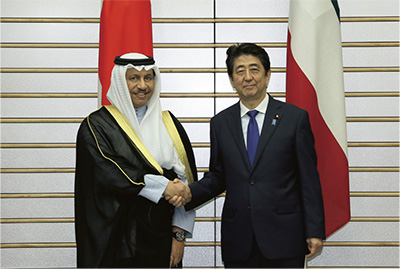 Prime Minister Abe and Prime Minister of Kuwait, H.H. Sheikh Jaber Al-Mubarak Al-Hamad Al-Sabah, shake hands at the Japan-Kuwait Summit Meeting (May 12, Tokyo, Photo: Cabinet Public Relations Office)
Prime Minister Abe and Prime Minister of Kuwait, H.H. Sheikh Jaber Al-Mubarak Al-Hamad Al-Sabah, shake hands at the Japan-Kuwait Summit Meeting (May 12, Tokyo, Photo: Cabinet Public Relations Office)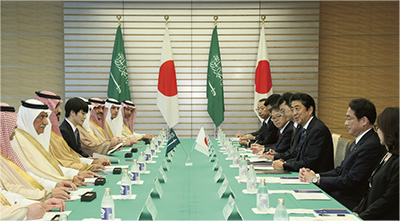 Prime Minister Abe meets with Deputy Crown Prince of Saudi Arabia, H.R.H Prince Mohammad bin Salman (September 1, Tokyo, Photo: Cabinet Public Relations Office)
Prime Minister Abe meets with Deputy Crown Prince of Saudi Arabia, H.R.H Prince Mohammad bin Salman (September 1, Tokyo, Photo: Cabinet Public Relations Office)Amid considerable challenges in the Middle East region, Saudi Arabia and several Arab states cut diplomatic ties with Iran in 2016, and Yemen peace talks stalled with the increasing number of civilian casualties.
The Gulf states need to review their fiscal policy following a decline in their annual revenue due to low oil prices since summer 2014. They consider social and economic infrastructure development, industrial diversification, and human resource development as important issues with a view to the long-term goal of breaking dependence on oil and developing the private sector. In April 2016, “Saudi Vision 2030” was announced with a basic strategy to move away from its dependency on oil and to achieve its comprehensive development. Japan engages in improving the mutual business and investment environment by concluding various agreements with the Gulf states while continuing to strengthen the “Comprehensive Partnerships” in a wide range of fields beyond energy.
B Yemen
Fighting between the government forces supported by the Arab coalition forces led by Saudi Arabia and the anti-government forces such as Houthi insurgents has continued in Yemen since 2015. Following a cease-fire in April 2016, peace talks resumed in Kuwait, but ended without reaching any agreement. The fighting has subsequently intensified. Currently, the UN and relevant parties such as the U.S., the UK, and Gulf Cooperation Council (GCC) countries continue mediation effors for peace.
The humanitarian situation is extremely serious due to the protracted conflict and aggravated combat. Consequently, the Government of Japan has provided assistance to overcome the humanitarian crisis in Yemen through efforts such as announcing new food assistance at the Meeting on the Humanitarian Situation in Yemen at the UN General Assembly in September, which is highly appreciated by the government of Yemen and the international community.
